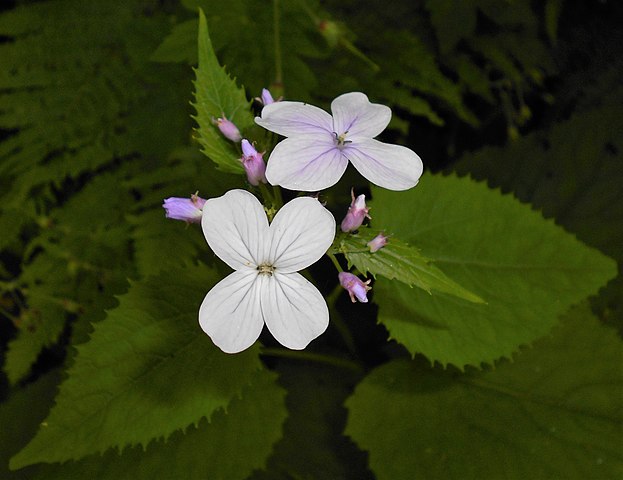 |  |  |  |  |
 |  |  |
Perennial Honesty is a perennial plant that grows up to 100-120 cm in height. The stem is erect, slightly hairy, covered with white hairs, branched at the top. The leaves are large, heart-shaped, dark green in color, whole, toothed along the edge, hairy near the veins. The lower leaves are arranged oppositely, the higher ones gradually. The flowers are fragrant, four-leafed, purple in color, arranged in a shield-shaped inflorescence, which passes into a panicle. The plant begins to bloom in April and continues for a month. Under natural conditions, the Perennial Honesty begins to bloom in the sixth-seventh year of life, with cultivation already in the second year.
Fruits - pointed, from both sides, pods. 4-6 small, flat, kidney-shaped seeds develop in the pod. The plant begins to produce seeds in mid-summer. Perennial Honesty reproduces only by seeds, their germination is preserved for 3 years. There are also cultures derived from this plant: Purple, Alba, Variegata.
The seeds of the plant, which are collected in mid-August-September, are used for medicinal purposes. Closer to autumn, the seed pods already mature, become hard and take on a light gray shade. The stems are cut along with the ground, then they are dried for no longer than two weeks. During this time, the seeds are fully matured and can die. Stored in paper bags for 2 years.
The chemical composition of Perennial Honesty is little studied. The seed oil is known to contain nervonic acid, erucic acid, linoleic acid, palmitic acid, stearic acid, eicosenoic acid, flavonoids and trace elements.
Medicinal significance
High amounts of erucic acid and nervonic acid have been found in the seeds of Perennial Honesty . Erucic acid - unsaturated, easily soluble Omega 9 acid, which in large quantities is harmful to the human body. Based on research, erucic acid has a negative effect on the heart muscle, causes cirrhosis of the liver, and slows down the body's reproductive maturity. Nervonic acid - on the contrary, creates a strong, targeted effect, strengthens and restores nerve tissues, normalizes their signal conduction. It promotes the complete regeneration of brain cells and neurons, improving the function of memory, speech, and perception. Which, in turn, allows this acid to be used for the treatment of serious diseases, such as Alzheimer's, Parkinson's disease, children's cerebral palsy, senile dementia. The presence of flavonoids strengthens fine capillaries, regulates blood pressure, stimulates the function of the adrenal cortex.
In folk medicine, Perennial Honesty has been known for a long time! The seeds of the plant have diuretic and sedative (calming) properties. A water infusion of the seeds is used in epilepsy, convulsions in children. It is also used as a diuretic for the treatment of various diseases of the urinary system. A decoction of Perennial Honesty seeds helps to prevent edema, cystitis, it is also used in case of abdominal spasms.
Migraines are also treated with this plant, women use its seeds to relieve premenstrual syndrome. Currently, this plant is no longer popular in folk medicine, because it remains rarer and less common in nature. And when you meet it, I invite you too, just look at it and move on.
